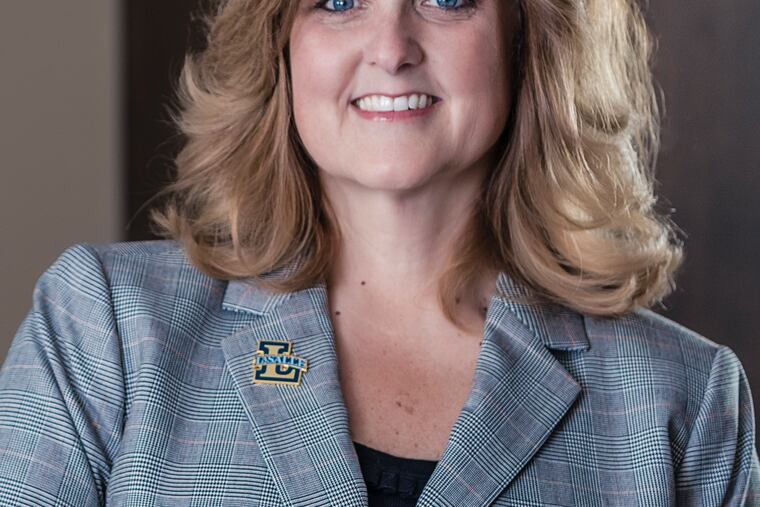Female board members outnumbered by men at Philly’s colleges and hospitals, new study finds
Women occupy 28% of board seats at Philly's healthcare systems and hospitals, 32% at colleges and universities.

Philadelphia’s nonprofit hospitals and universities are the subjects of a first-of-its-kind analysis that reveals women are severely underrepresented in the boardrooms of the region’s prominent “eds-and-meds” institutions.
“The Gender Gap in Nonprofit Boardrooms: The 2019 Census of Women Board Members of the 50 Largest Medical and Educational Institutions in Greater Philadelphia” found that Albert Einstein Healthcare Network and Inspira Health Network have the fewest women on their hospital boards of directors, tying for last place.
The top-ranked hospital for the proportion of female board members is Doylestown Hospital.
Among universities, Eastern University ranked last, while Bryn Mawr College — whose students are all female at the undergraduate level — ranked first with the most women on its board.
The report examines gender diversity on nonprofit boards of the region’s 50 largest universities and hospital systems, for which Philadelphia is well-known. It is a joint project of La Salle University, The Nonprofit Center at La Salle University’s School of Business, and the Women’s Nonprofit Leadership Initiative.
The 50 institutions included are among the largest Philadelphia-area hospitals, health systems, and universities, and in some cases exceed for-profit companies in revenue and employees. Women of color are particularly underrepresented, the report found.
According to the report, released Thursday, here are some key findings:
Women comprise only 28% of the hospital boards and 33% of higher education boards, on average; the hospital board numbers fall below the minimum 30% goal set by the Pennsylvania House of Representatives.
Thirteen of the area’s 25 largest hospitals and health-care institutions had fewer than 30% women on their boards. Of these, five had fewer than 20% women.
Fourteen of the area’s largest higher education institutions had boards with fewer than 30% of women, and of these, eight had fewer than 20% women.
Only four of the 25 higher ed institutions reached or exceeded parity (50%) of women on their boards, and all of these are historically women’s institutions (Bryn Mawr, Immaculata, Cabrini, Arcadia). Only one of the 25 health-care institutions reached or exceeded parity of women on their boards: Doylestown Hospital, also founded by a women’s organization.
Of the 50 medical and education institutions, only 11 had female board chairs (six in meds and five in eds).
The eds-and-meds boards averaged 13% people of color, the majority of whom are men.
“To anyone who believes in the power of women as leaders and the advantages that a diverse group of minds can bring to solving any problem, the data here are sobering,” said Colleen Hanycz, president of La Salle University.
The report was released Thursday on the websites of the La Salle Nonprofit Center (www.lasallenonprofitcenter.org) and the Women’s Nonprofit Leadership Initiative (www.WNLI.org).
In addition, Hanycz will present the data at an event at the Montgomery McCracken law firm in Center City Thursday afternoon.
“Half of our Philadelphia institutions don’t make it” to even the 30% board representation recommended by the state, said Carolyn Adams, former dean of Temple University’s College of Liberal Arts. “We really need to change that.”
“It’s not surprising, but it is shocking,” said Vicki Kramer, a member of the Women’s Nonprofit Leadership Initiative, a consultant to nonprofits, and lead author of “Critical Mass on Corporate Boards: Why Three or More Women Enhance Governance.”
“Their goal and mission is servicing patients and students, and in Greater Philly, the majority of college students are female,” said Adams. “And in health care, decision-makers and customers tend to be women. Governing boards who don’t understand those customers aren’t functioning as well as they might. Women of color are even more underrepresented.”
Top women in health care weren’t surprised at the study’s results.
“Women are grossly underrepresented at the highest levels of leadership here in Philadelphia and nationally. The question now is how do we fix this,” said Nancy Spector at Drexel University. Of Drexel’s 51 board seats, 23.5% are occupied by women.
“And the answer is not to ‘fix the woman,’ but to fix the process of how board members are selected. This city alone is full of highly qualified women in the health care and higher education fields who would bring needed diversity to the intellectual and social capital of boards,” said Spector.
“This would require boards to enforce gender parity, be transparent about their selection process, and establish metrics,” she said.
WNLI and LaSalle plan to conduct the study every three years.